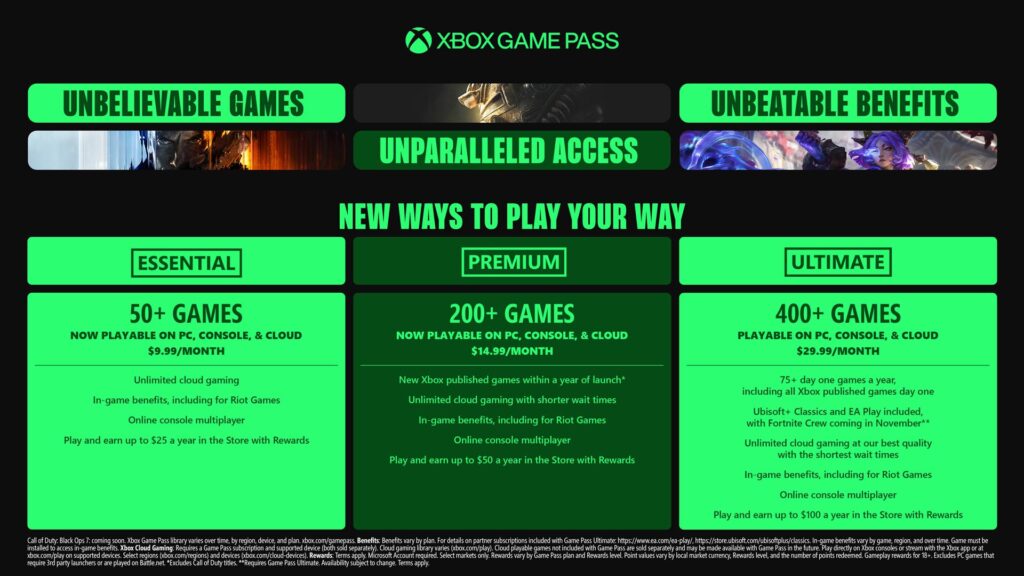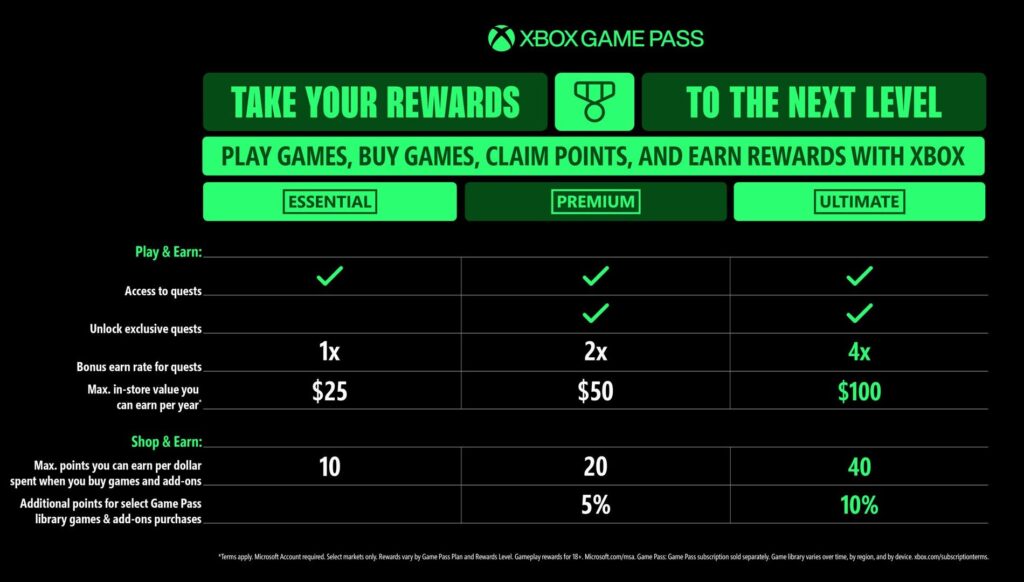Main Navigation Menu
© 2025 Tech Jacks Soutions, All Rights Reserved
© 2025 Tech Jacks Soutions, All Rights Reserved

ROG Xbox Ally disaster unfolds as Game Pass subscription price catastrophe undermines the $999 handheld’s value proposition before launch. Microsoft reportedly discussed making the ROG Xbox Ally cheaper, but negotiations failed, creating catastrophic timing where $360 annual Ultimate subscription costs combine with premium hardware pricing to create $1,359 first-year investment. The convergence exposes fundamental strategy failure where Microsoft’s handheld ambitions collide with subscription service greed destroying ecosystem affordability.

Windows Central confirms Microsoft lost $300 million in Call of Duty sales from Game Pass Subscription availability undercuts full-price sales from existing Xbox ecosystem users. The Call of Duty Game Pass issue highlights a core subscription problem where service access replaces ownership, rather than broadening market reach to new customer groups.
Reddit discussion reveals 82% of Black Ops 6 copies sold were on PlayStation 5 where Game Pass unavailability forced traditional purchasing. The platform comparison shows how Xbox’s subscription availability eliminated direct sales, while PlayStation’s subscription-free model maintained full-price revenue streams, preserving Call of Duty’s commercial viability.
The $300 million loss amounts to pure revenue loss, as Game Pass subscribers received “free” access to content they would have bought at a $70 retail price. The Call of Duty Game Pass failure confirms worries about subscription services teaching consumers to expect premium content without paying directly, which could harm publishers’ revenue models.
Push Square declares Xbox squandered over $300 million putting Call of Duty in Game Pass characterizing decision as wasteful rather than strategic investment. The editorial positioning reflects industry consensus that Microsoft’s subscription strategy destroys value rather than creating sustainable business models supporting AAA game development.

PC Gamer reports former FTC chair says “I told you so” as Microsoft lays off thousands and jacks up Game Pass prices validating regulatory warnings that Activision-Blizzard acquisition would harm both consumers and industry workers. The Call of Duty Game Pass disaster provides concrete evidence supporting the FTC’s merger opposition through documented consumer price hikes and developer layoffs following the deal’s completion.
Video Games Chronicle confirms former FTC chair says it warned Activision deal would “harm gamers” as price hikes follow acquisition exactly as regulatory analysis predicted. The vindication moment shows how corporate merger promises about consumer benefits often prove false when market dominance leads to exploitation instead of competitive innovation.
The FTC’s prescient warnings about post-merger price increases are confirmed by 50% hikes in Game Pass Ultimate costs, which directly contradict Microsoft’s testimony claiming consumer benefits from the acquisition. The Call of Duty Game Pass fiasco reveals failures in the merger approval process, where corporate promises face insufficient scrutiny from regulators who accept profit-driven assurances at face value.
Regulatory approval extends beyond pricing to include mass layoffs affecting thousands of Activision Blizzard employees after the acquisition. When companies promise job security during merger proceedings but then conduct widespread layoffs afterward, it highlights a pattern of dishonesty that calls for stronger regulatory skepticism and enforcement mechanisms.

Economic Times reports Microsoft raises top Xbox Game Pass subscription by 50% creating direct connection between Call of Duty inclusion and consumer cost increases. The Call of Duty Game Pass disaster exposes a subscription pricing strategy where adding AAA games justifies aggressive monetization, extracting value from a captive subscriber base rather than expanding market reach.
The timing of the pricing suggests that including Call of Duty acts as a justification mechanism, allowing Microsoft to implement long-desired cost increases under the guise of increased library value. When companies add expensive content alongside significant price hikes, the coordination reveals an extraction strategy rather than genuine value improvement benefiting consumers.
Gam3s.gg explains Xbox Game Pass price changes contextualizing tier restructuring as response to Call of Duty economics requiring revenue recovery from subscription model destroying traditional sales. The analysis shows how including AAA on day one leads to unsustainable economics that require either subscriber growth surpassing revenue losses or aggressive price hikes to stay profitable.
The Call of Duty Game Pass disaster highlights the fundamental problem with the subscription model, where the value proposition depends on costly content additions that can’t generate enough revenue through affordable pricing. When services are forced to choose between unsustainable costs or unaffordable prices, the business model becomes economically illogical regardless of which option companies pick.

Windows Central declares “Game Over Xbox Game Pass — the one-size-fits-all plan has destroyed what made it great” mourning service evolution from consumer-friendly value proposition to exploitative pricing scheme. The Call of Duty Game Pass disaster represents inflection point where subscription shifted from an innovative accessibility model into corporate extraction mechanism prioritizing profit over player satisfaction.
The “what made it great” reflection highlights original Game Pass value as affordable access to large libraries that enable game discovery and experimentation. When price hikes remove affordability and tier fragmentation limits library access, the service evolution undermines the consumer benefits that originally justified adoption and gained industry praise.
The one-size-fits-all criticism addresses tier proliferation, which creates complexity as consumers must navigate Essential, Premium, and Ultimate options with different features and restrictions. The Call of Duty Game Pass disaster worsens this issue through unclear value propositions, where marketing messaging fails to clearly explain why dramatic price increases are benefits for consumers rather than signs of exploitation.
The service destruction narrative indicates irreversible damage where erosion of consumer trust prevents recovery, no matter what future policy changes are made. When companies betray the value propositions that built customer loyalty, the reputation consequences last beyond individual controversies, impacting long-term platform sustainability and competitive advantage.

Forbes argues Xbox Game Pass needs to change and Call of Duty can help pave the way suggesting AAA inclusion justifies subscription restructuring. The Call of Duty Game Pass disaster shows how industry advocates justify consumer-hostile policies by framing exploitation as necessary evolution instead of corporate greed.
The phrase “pave the way” suggests that including Call of Duty promotes positive change, even though evidence shows service deterioration due to price hikes and feature restrictions. When media coverage portrays corporate extraction as beneficial, journalism neglects consumer advocacy by uncritically accepting profit-driven narratives.
The Forbes viewpoint reflects industry insider attitudes, where maintaining access and relationships requires sympathetic coverage of corporate decisions, regardless of their impact on consumers. The Call of Duty Game Pass controversy reveals structural conflicts, as gaming journalism relies on publisher cooperation, creating incentives that misalign editorial independence with business goals.
The advocacy for change overlooks alternatives, such as Microsoft absorbing Call of Duty costs through corporate subsidies to keep consumer prices affordable. When analyses assume price increases are the only viable response to costly content additions, they limit the discussion and exclude consumer-friendly solutions that could reduce corporate profits.

The PlayStation 5’s 82% share of Call of Duty sales demonstrates a competitive advantage where the absence of subscription services preserved traditional revenue models. The Call of Duty Game Pass disaster creates a market dynamic where Sony’s pricing restraint and ownership model superiority attract consumers who prefer permanent purchases over temporary subscription access.
The platform sales disparity suggests that Game Pass availability on Xbox has actively harmed Call of Duty’s commercial performance by training users to expect “free” access rather than purchasing games directly. When subscription services on one platform undermine cross-platform sales, the business model becomes harmful to franchises that rely on multi-platform revenue streams to cover development costs.
The dominance of PlayStation validates Sony’s resistance to a day-one first-party Game Pass equivalent despite industry pressure toward subscription models. The Call of Duty Game Pass disaster demonstrates strategic wisdom in maintaining traditional sales methods that preserve revenue and avoid the inherent unsustainability of subscription economics.
The competitive implications indicate that Microsoft’s aggressive pursuit of subscription services creates market opportunities for rivals who practice pricing restraint and preserve ownership models. When industry leaders engage in exploitative monetization, these strategic errors allow competitors to stand out through consumer-friendly alternatives, capturing dissatisfied user bases.

The thousands of layoffs affecting Activision Blizzard employees validate FTC warnings about workforce harm following Microsoft’s acquisition. The Call of Duty Game Pass disaster extends beyond consumer pricing to include systematic job cuts that contradict merger promises of employment security and studio independence.
The timing of layoffs after approval of the acquisition reveals corporate dishonesty, as merger processes often involve employment guarantees that are later broken once regulatory oversight lessens. When companies systematically fire workers after promising job protection, it shows that merger promises can be unreliable, highlighting the need for stronger regulatory skepticism.
The harm to developers worsens as Game Pass economics undermine traditional sales revenue that funded studio operations and employee pay. The Call of Duty Game Pass disaster puts downward pressure on development budgets when subscription cannibalization reduces direct sale income without replacing the losses through subscriber growth.
Industry implications indicate that subscription models threaten the sustainability of AAA game development by undermining revenue streams that support large-team projects. When services destroy traditional sales without generating equivalent income, this economic shift leads to studio consolidation and workforce reductions, harming creative diversity and employment stability.

The Call of Duty Game Pass disaster confirms Federal Trade Commission warnings that Activision-Blizzard’s acquisition would harm consumers through systematic exploitation rather than fostering competitive innovation. The $300 million revenue loss highlights a fundamental flaw in the subscription model, where including AAA titles on day one eliminates direct sales without attracting enough new subscribers to compensate.
This damaging cannibalization reveals the unsustainable nature of subscription economics, where costly content additions cannot generate enough revenue through affordable pricing. Microsoft faces an impossible choice: absorb losses from unsustainable costs or set prices so high that subscribers leave, resulting in a lose-lose situation regardless of their strategic approach.
FTC’s findings provide real-world evidence against corporate merger promises of consumer benefits. The patterns of price hikes and mass layoffs after the acquisition approval show how profit-driven assurances often prove false once a company gains market dominance and can exploit consumers without fear of competition.
The justification for price increases shows that Call of Duty’s inclusion acts as a tool for extracting maximum monetization under the guise of an improved game library. The coordination of new AAA titles with sharp cost hikes exposes a strategy that prioritizes revenue over genuine consumer benefit.
Turning a service designed for accessibility into an exploitative pricing scheme, the destruction of the subscription model eliminates the affordable access and extensive library that originally attracted users. The rise of subscription tiers and feature restrictions further devalues the service, adding complexity that conceals ongoing consumer harm.
Forbes’ advocacy reveals that industry media often have conflicts of interest, where maintaining publisher relationships leads to biased coverage that favors corporate interests over consumer protection. The unchecked framing of exploitation as positive evolution exposes a journalistic failure to serve readers’ best interests.
PlayStation’s 82% market share affirms Sony’s resistance to subscription changes and its commitment to ownership models, offering a competitive advantage with consumer-friendly alternatives. Microsoft’s aggressive subscription strategy opens market space for rivals who can differentiate themselves through fair pricing and permanent ownership options.
Developer layoffs confirm FTC concerns about workforce stability, while the flawed subscription economics threaten the sustainability of AAA game development. Revenue losses without viable replacements push studios toward consolidation and staff reductions, harming creative diversity and industry health.
Smart consumers should see the Call of Duty Game Pass collapse as a warning about the limitations of subscription models and the risks of corporate mergers. The exploitation following Activision-Blizzard’s acquisition provides clear evidence supporting regulatory action to prevent unchecked market consolidation and price hikes.
The gaming industry needs business models that promote sustainable growth while respecting consumer budgets through fair pricing and ownership models. The disaster of Call of Duty Game Pass proves that prioritizing profits over industry health results in exploitation, damaging developers, consumers, and the future viability of gaming platforms.
